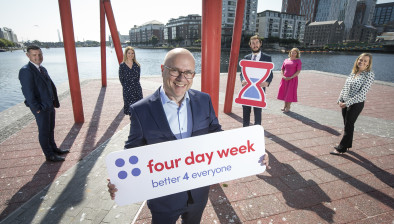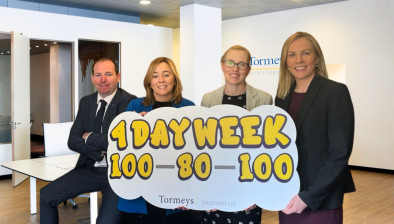Irish lawyers say yes to four-day work week in ILN poll

Irish lawyers are overwhelmingly in favour of a four-day work week, an Irish Legal News poll has — perhaps unsurprisingly — found.
Of the 183 readers who responded to the survey we conducted from Tuesday to Wednesday, an emphatic 89 per cent said they believe lawyers should work a four-day week, with just 11 per cent opposed.
Solicitors and younger lawyers were more strongly in favour of a four-day week, while barristers and older lawyers were more sceptical.
All of the respondents in the 18–24 age category were in favour of a four-day week, while those aged 55 and over were more evenly split, with 55 per cent in favour and 45 per cent opposed.
An overwhelming 94 per cent of solicitor respondents were in favour with just six per cent opposed, while barristers were more reserved, with 68 per cent in favour and 32 per cent opposed.
One respondent identified themselves as a judge over the age of 55 and said they were opposed.
‘Hell yes we need a four-day week!’
In comments, those opposed to a four-day week expressed scepticism that it could be achieved. “It’s not a reality for lawyers as court dates etc. are beyond our control,” one reader said. A number of respondents said it would be impossible for a firm to adopt four-day working unless their clients did the same.
“We lawyers are service providers and therefore we accord to what our clients need,” one said. “At the moment the vast majority of clients are five days a week. When/if a four-day week becomes commonplace we lawyers can then consider moving to it, but I don’t think a firm will survive if it unilaterally goes to a four-day week before its clients do.”
Others, however, said they felt a four-day week was the future and law firms could take the lead.
One respondent said: “I think a four-day work week would be an ideal for a large part of the general workforce and it hopefully represents the future of work patterns. An industry like law taking a lead would help make this a reality sooner rather than later.”
Another polemicised: “Always on. Always available. Answer the email. Take the call. Do it all to an unimpeachable standard. Bill 10 hours on an eight-hour day. Give a damn. Provide advice and support to the traumatised and distressed client. Is it any wonder depression, anxiety and stress are such issues for lawyers?
“Hell yes we need a four-day week! Other professions do it to protect their members and ensure they are well placed to deliver when working. No to presenteeism! No to the culture of late nights and overwork. Yes to valuing ourselves as well as the work we do.”
Another pointed out: “Most working mums already work a reduced week — certainly I do and the majority of my female colleagues who have young children at home.
“The day at home is 100 per cent harder than the day in the office! Yet the expectation is that I can pick up work on the day off/or am relaxing at home. Incidentally no male colleagues with young children work a reduced week.
“If a reduced week was being rolled out across the office I think the costs or a reduced salary would be a big factor. Certainly those working a reduced working week currently have had to take a pay cut/lose out on targets and bonuses. Perhaps it might level the playing field!”
‘There is no reason why the four-day week cannot work in law firms’
Belfast-based JMK Solicitors introduced a four-day or 30-hour work week for all employees in January 2020 with no reduction to pay or benefits. The firm is part of the Four Day Week Ireland campaign, which advocates for a gradual, steady, managed transition to a shorter working week for all workers.
Michelle Murphy, head of HR and operations at JMK Solicitors, told Irish Legal News: “Three years on, we are happy that the project has been a success. There have been plenty of challenges along the way, not least a global pandemic, but our business has continued to grow with a 30 per cent increase in staff numbers in that time frame.”
She added: “We recognise what is echoed in the comments you’ve shared that working as a lawyer is demanding, stressful and can lead to burn out and other mental health conditions.
“Our success is due to our team and for that reason we have invested in this and other initiatives so that JMK is a great place to work and our team feel valued and able to enjoy time away from work with friends and families. 100 per cent of our team would recommend JMK as a place to work. Our staff turnover and absence rates are negligible.
“I think we’ve proven there is no reason why the four-day week cannot work in law firms. Yes, clients expect a good service and we provide that five days a week like any other practice. We manage to do so by communicating with clients, courts, third parties and each other so that the day to day work is not impacted.
“What it takes for the project to work is the input and commitment of the team. You need to be able to rely on your colleagues and be prepared to help them out to make sure the clients still receive the same level of service they expect. Our client recommendation rate has increased to 99 per cent since starting the reduced working week in 2020.”
Ms Murphy concluded: “I’m delighted to hear that 89 per cent of your participants are in favour of the four-day week. It could only benefit the profession making it a modern and attractive industry to work in for the future.”










